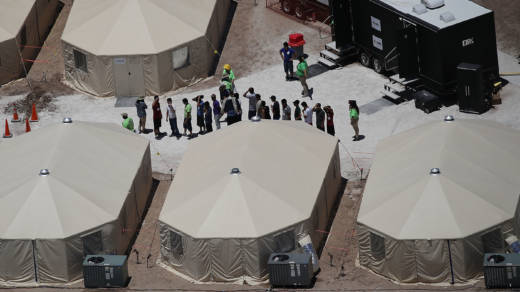Hundreds of unaccompanied migrant children in shelters in California could be released to parents and other sponsors more rapidly, after the Trump administration reversed a policy Wednesday that had required fingerprinting everyone in the household of a prospective sponsor.
Fingerprints will still be required of all sponsors and will be cross-checked with the Federal Bureau of Investigation and U.S. of Homeland Security databases, according to a spokeswoman for the U.S. Department of Health and Human Services. The department's Office of Refugee Resettlement is responsible for unaccompanied children in immigration custody.
The change could alleviate unprecedented crowding of ORR shelters, which now house roughly 14,600 children nationwide — double the number compared to less than a year ago. More than 400 of those kids were in California facilities as of last week, according to data from the Associated Press.
"It's a start in the right direction," said Holly Cooper, co-director of the UC Davis Immigration Law Clinic. "What we're seeing are just booming numbers of kids who are being detained, and it's not because there are more kids being apprehended. It's that kids are getting out more and more slowly."
Cooper is one of the attorneys representing migrant children in the landmark 1997 Flores settlement agreement which says that minors should be released "without unnecessary delay" to a parent or another approved sponsor.
Across-the-board fingerprinting requirement began in June, when the government implemented a "zero tolerance" policy that separated almost 2,700 migrant children from their parents. Those separated children were placed in ORR shelters along with minors who had entered the U.S. without parents.
The average length of time that children spend in shelters has increased from 40 days in fiscal year 2016 to 59 in fiscal year 2018, according to federal data reported by the Associated Press.
"Since the implementation of this new policy in June 2018, ORR has determined that the new checks of all household members have generally not yielded additional information that has enabled ORR to identify new child welfare risks," the agency said in announcing the reversal. "In addition, the time which all household members take to submit fingerprints affects the length of care" for children in government custody."
Cooper said keeping children in federal custody for weeks or months can have profound psychological, emotional and even health impacts on children.
"The hope is that more children will be released to stable families more quickly," Cooper said of the policy change. "The additional hope is that children will have less psychological trauma from separation, from incarceration."
KQED Reporter Farida Jhabvala Romero contributed to this report.
